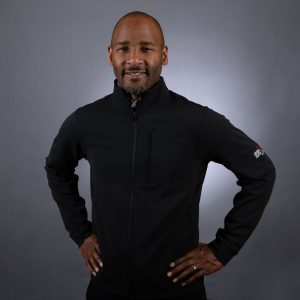A Conversation with Craig C Brown
“I have a passion for helping athletes”
Craig C Brown is a Mental Performance Assistant with CSCM. He also works on various other projects, focusing on anti-racism in sport, newcomers in sport and more. We sat down to talk with Craig about some of his experiences as a Black person working in mental health and sports. This interview has been edited for length and/or clarity.

Craig, on his start in sports:
I started playing sports at a very young age. So at prep school level, or elementary school level, I swam for my school, I played table tennis for my school and in high school I switched to playing basketball, and then that was it for my playing career. But I grew up in a family that was crazy about sports. So we have been following sports for a very long time.
Craig, on working in sport:
Transitioning to actually working in sport has been a long journey. Because though I have a background in psychology, I started working in business and I was working in banking for about 10 and a half or 11 years. And then when we, my wife and I, got the opportunity to move to Canada, she said, “Okay, what do you want to do with your life?” and two things were on my heart; either doing counseling psychology or sports psychology, or any combination of both. And that’s when I reached out to professors here and got the opportunity to come to the U of M and work with Dr. Leisha Strachan. And when I got here, with her focus in sports psychology, she was doing work with the University of Manitoba Bison, women’s soccer team. And then she just drew me in, she said, “Hey, I’m doing work with them, do you want to just come and shadow and be a part of it?” Since then, I’ve been heavily involved in different teams. So between Dr. Strachan and Adrienne [Dr. Adrienne Leslie-Toogood], they’ve definitely opened up a lot of doors where I can shadow and learn from them and provide general assistance based on their guidance. So since then I’ve been working with them with a few teams and working with individual athletes at the center [CSCM]. So that’s been my journey.
Craig, on why he works in sport:
The reason I’m involved in sport is not just because it’s an area of interest, or because I have a background in it. It’s really because I have a passion for helping athletes I’ve seen over the years, being involved in sport and watching sport for so long. There’s so many athletes and so many incidents that have happened, where I wonder if that person had the support that they needed, if it would have turned out differently. So my drive is just to be that person that athletes might have needed, whether it be on a performance level or any sort of mental support level, just to be that person to make a difference, if possible, for athletes going forward.
Craig, on being Black in sport and the mental health profession:
One of the things about being a person of color, just from a cultural background, there’s some sports that are promoted when you’re coming from a third world country. So soccer, track and field, basketball, cricket. So there’s some sports that you are naturally directed towards.
In terms of the mental health support part, I think more and more, I’ve just looked at a lot of athletes of colour, and it’s recognizing that representation is indeed important, just being in the space. From a Canadian context, I will say, I don’t see a lot of persons of color, or a lot of black persons and black men involved in mental health support for athletes or mental health support in general. But of course, I don’t know all the mental health professionals in Canada. But when I’m in spaces interacting with other mental health or mental performance providers, I don’t see a lot of people that look like me. And I had an interaction with some athletes recently, and someone else observing said, “they would never have come to me in the way that they approached you. And it’s clearly because you’re a black male in the space, and that seems to have made a difference.” So I think, yes, my position as a black male in mental health, in particular in sport, is something that’s relevant because you don’t have as many persons that look like me in that space, doing what I do. Also, I think that there are persons of color, and it’s shown in research too, that because they don’t see a person that looks like that when it comes to mental health, or health seeking, or even mental performance, that many don’t actually go to get the help that they need because they don’t see people that look like them.
Craig, on how to find the right help if you need it:
First and foremost, if you need help, go get help. So if the help is available, utilize the channels that are available to you. If there’s someone there, especially if they’re qualified to provide that support and help, regardless of how they look, get that help first. Get that help first and then try to find somebody that is within your neighborhood, within your city, within your province that looks like you. If you prefer somebody based on representation, there is a Black Mental Health professional network or even just Google.
Craig, on getting started working with sport:
I would say, for anyone who wants to be involved in the space, don’t let it be that ‘it doesn’t look like something that you see anyone that looks like you so you’re not going to pursue it’. I think that’s what happens with some persons of color. Whenever they think of a career, they don’t see enough people that look like them. So they think, “okay, that field isn’t for me”. I’d encourage anyone, persons of color, yes, but anyone, don’t let it just be a representation thing. If that’s a passion of yours, if that’s an area that you want to make a difference in, if that’s something that connects with you, talk to people, get information and pursue it. Don’t let representation alone be the thing that keeps you out.


